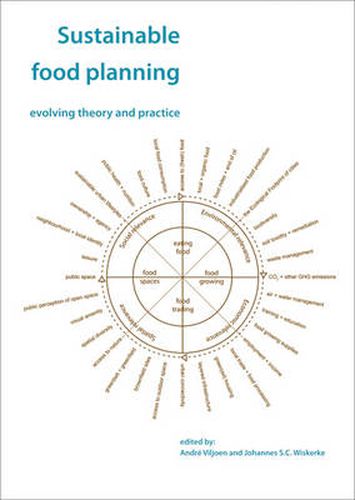Readings Newsletter
Become a Readings Member to make your shopping experience even easier.
Sign in or sign up for free!
You’re not far away from qualifying for FREE standard shipping within Australia
You’ve qualified for FREE standard shipping within Australia
The cart is loading…






With over half the world’s population now deemed to be urbanised, cities are assuming a larger role in political debates about the security and sustainability of the global food system. Hence, planning for sustainable food production and consumption is becoming an increasingly important issue for planners, policymakers, designers, farmers, suppliers, activists, business and scientists alike. The rapid growth of the food planning movement owes much to the fact that food, because of its unique, multi-functional character, helps to bring people together from all walks of life. In the wider contexts of global climate change, resource depletion, a burgeoning world population, competing food production systems and diet-related public health concerns, new paradigms for urban and regional planning capable of supporting sustainable and equitable food systems are urgently needed. This book addresses this urgent need. By working at a range of scales and with a variety of practical and theoretical models, this book reviews and elaborates definitions of sustainable food systems, and begins to define ways of achieving them. To this end 4 different themes have been defined as entry-points into the discussion of ‘sustainable food planning’. These are (1) urban agriculture, (2) integrating health, environment and society, (3) food in urban design and planning and (4) urban food governance.
$9.00 standard shipping within Australia
FREE standard shipping within Australia for orders over $100.00
Express & International shipping calculated at checkout
With over half the world’s population now deemed to be urbanised, cities are assuming a larger role in political debates about the security and sustainability of the global food system. Hence, planning for sustainable food production and consumption is becoming an increasingly important issue for planners, policymakers, designers, farmers, suppliers, activists, business and scientists alike. The rapid growth of the food planning movement owes much to the fact that food, because of its unique, multi-functional character, helps to bring people together from all walks of life. In the wider contexts of global climate change, resource depletion, a burgeoning world population, competing food production systems and diet-related public health concerns, new paradigms for urban and regional planning capable of supporting sustainable and equitable food systems are urgently needed. This book addresses this urgent need. By working at a range of scales and with a variety of practical and theoretical models, this book reviews and elaborates definitions of sustainable food systems, and begins to define ways of achieving them. To this end 4 different themes have been defined as entry-points into the discussion of ‘sustainable food planning’. These are (1) urban agriculture, (2) integrating health, environment and society, (3) food in urban design and planning and (4) urban food governance.